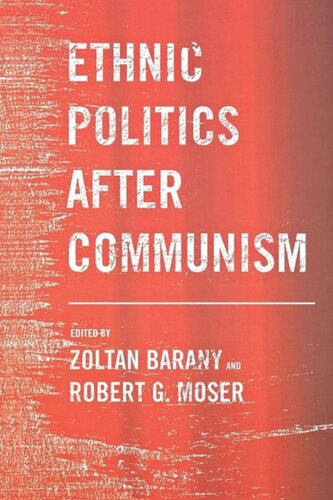

Most ebook files are in PDF format, so you can easily read them using various software such as Foxit Reader or directly on the Google Chrome browser.
Some ebook files are released by publishers in other formats such as .awz, .mobi, .epub, .fb2, etc. You may need to install specific software to read these formats on mobile/PC, such as Calibre.
Please read the tutorial at this link: https://ebookbell.com/faq
We offer FREE conversion to the popular formats you request; however, this may take some time. Therefore, right after payment, please email us, and we will try to provide the service as quickly as possible.
For some exceptional file formats or broken links (if any), please refrain from opening any disputes. Instead, email us first, and we will try to assist within a maximum of 6 hours.
EbookBell Team

4.4
42 reviewsThe Soviet Union encompassed dozens of nationalities and ethnicities, and in the wake of its collapse, the politics of ethnicity within its former borders and throughout Eastern Europe have undergone tremendous changes. In this book, Zoltan Barany and Robert G. Moser bring together eminent scholars whose theoretically diverse and empirically rich research examines various facets of ethnicity in postcommunist Europe and Eurasia: ethnic identity and culture, mobilization, parties and voting, conflict, and ethnic migration. The contributors consider how ethnic forces have influenced political outcomes that range from voting to violence and protest mobilization to language acquisition. Conversely, each chapter demonstrates that political behavior itself has an impact on the forms and strength of ethnic identity. Thus, ethnicity is deemed to be a contested, malleable, and constructed force rather than a static characteristic inherent in the attributes of groups and individuals with a common religion, race, or national origin.
Contributors: Zoltan Barany, University of Texas at Austin; Mark R. Beissinger, University of Wisconsin–Madison; Daniel Chirot, University of Washington; Charles King, Georgetown University; Will Kymlicka, Queen's University; David D. Laitin, Stanford University; Robert G. Moser, University of Texas at Austin; Roger D. Petersen, Massachusetts Institute of Technology; Ronald Grigor Suny, University of Chicago